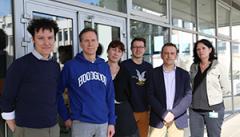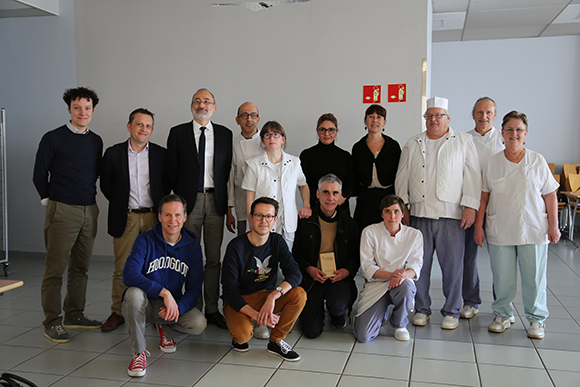
INSA LYON
INSA Lyon wins award for a more responsible campus
 INSA Lyon has joined the family of Campus Responsables award winners. On the occasion of the 6th year of the Trophées des Campus Responsables (Responsible Campus Awards) held each year to reward higher education institutions that have implemented innovative sustainable development projects, INSA Lyon won an award for two of its inspiring projects: sustainable restaurants and ‘greener’ rainwater management. A meaningful award for the entire INSA Lyon community, which embarked several years ago on a global ecological transition. Explanations.
INSA Lyon has joined the family of Campus Responsables award winners. On the occasion of the 6th year of the Trophées des Campus Responsables (Responsible Campus Awards) held each year to reward higher education institutions that have implemented innovative sustainable development projects, INSA Lyon won an award for two of its inspiring projects: sustainable restaurants and ‘greener’ rainwater management. A meaningful award for the entire INSA Lyon community, which embarked several years ago on a global ecological transition. Explanations.
The product of collective momentum, the Trophées des Campus Durables (Sustainable Campus Awards) reflect the institution's commitment to sustainable development. ‘Taking part in this competition resonates with our approach and the Sustainable Development and Social Responsibility (SD&SR) certification we achieved last year and for four years. This demonstrates the enthusiastic and meaningful momentum of a wide variety of stakeholders, staff and students. Our campus is proving to be a great educational and scientific ‘testing ground’ for quality of life and work. Moreover, we are the only institution in the competition to have won awards for both projects submitted: our environmentally responsible restaurants and our sustainable management of rainwater!’, explains Mathieu Bouyer, head of the SD&SR unit.

Environmentally responsible restaurants
On the INSA Lyon campus, seven catering outlets distributing nearly 4,500 meals per day have been redesigned by students as part of the POLEn (Environmental Policy) project. ‘Thanks to the work of third-year Energy and Environmental Engineering students and the educational commitment of lecturers, we have worked on the responsible supply of foodstuffs (seasonality, short supply chains, sustainable agriculture), the quality of what we serve and its carbon cost, as well as on raising user awareness of the fight against food waste and the reduction of waste. An eco range offering vegetarian meals and low-carbon menus has been tested and integrated into the service on a long-term basis. All of these actions have made it possible to improve the environmental quality of restaurant operations while offering a higher quality and healthier diet’, says Carole Brunie, director of campus life at INSA Lyon.
More integrated rainwater management
The management of urban rainwater is a major challenge for the city of tomorrow in a context of increasing scarcity of the resource. The ‘full-scale’ experiments coordinated by the laboratoire DEEP (Waste, Water, Environment, Pollution) have gradually been integrated into the campus landscaping carried out by the Inter-University la Doua Estate Department: ponds, infiltration ditches and trenches, dry river, rain garden, porous car parks, storage pavements, etc. All these extensive devices that ‘filter the water where it falls’ make it possible to measure the flow of water and the removal of pollutants by the soil. They have proven to be more efficient than conventional systems (unitary networks, treatment plants). They also participate in the creation of cool areas in urban communities and the development of biodiversity in the city, which plays a complementary role in evapotranspiration and filtration of atmospheric pollutants. ‘We have been working with the Lyon metropolitan area on these issues for more than 30 years. The campus has become a technological showcase for local scientific know-how and a very important tool for the research facilities of the GRAIE (Water Research, Technical Coordination and Information Group), which brings together local authorities, companies and research organisations. This demonstration on the scale of an urban eco-campus is a source of inspiration for imagining and building the city of tomorrow’, explains Sylvie Barraud, director of the GCU (Department of Civil Engineering and Urban Planning) and lecturer and researcher at the laboratoire DEEP
An award that makes you want to continue to act
In view of the success of INSA Lyon's application for the Trophées de Campus Durables, Nicolas Gaillard, the institution's Deputy Director for Sustainable Development and Heritage, calls on those involved to continue their efforts. ‘Several collaborative projects are still to come! The approach of putting education and research applied to SD&SR issues on campus in a real-life situation is a winning recipe for the institution's strategy: students are educated on site in change management, research puts their skills into practice and the quality of life of campus users is improved. This award is a nice way to reassure us that we have been on a promising path for the past few years. We need to keep up the momentum together!’, concludes Nicolas Gaillard.
Keywords (tags)
News list
Une nouvelle direction pour structurer l’entrepreneuriat et l’innovation à l’INSA Lyon

